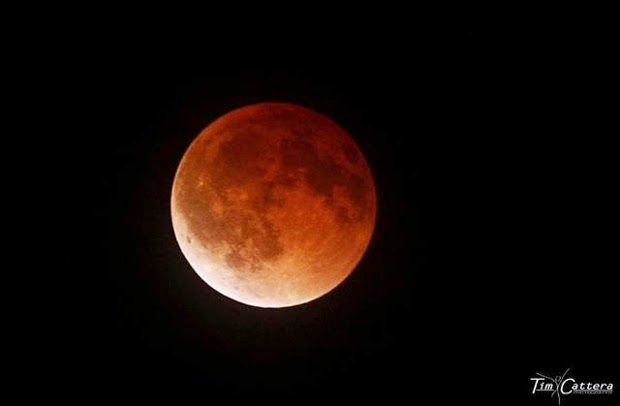THE SIGN OF BLOOD MOON
But this is that which was spoken by the prophet Joel;And it shall come to pass in the last days, saith God, I will pour out of my Spirit upon all flesh: and your sons and your daughters shall prophesy, and your young men shall see visions, and your old men shall dream dreams:And on my servants and on my handmaidens I will pour out in those days of my Spirit; and they shall prophesy:And I will shew wonders in heaven above, and signs in the earth beneath; blood, and fire, and vapour of smoke:The sun shall be turned into darkness, and the moon into blood, before that great and notable day of the Lord come:And it shall come to pass, that whosoever shall call on the name of the Lord shall be saved.(Acts 2:16-21)
Luckily, Monday's blood moon was the first in a series of four consecutive total eclipses. Within a year and a half, North America will be able to see a moon colored like a desert sunset three more times.
The four blood moons will occur in roughly six-month intervals on the following dates: April 15, 2014; October 8, 2014; April 4, 2015, and September 28, 2015. Miss those, and you'll have to wait until 2032.
One might be misled into thinking that blood moons are commonplace. There are about two lunar eclipses per year, NASA says. Some of them -- penumbral eclipses -- are so subtle, they are vaguely visible and go greatly unnoticed. Other eclipses just cast a partial shadow on the moon but lend it none of that brilliant sunset hue.
Lunar eclipses -- penumbral, partial or umbral -- occur in random order, NASA says. Getting four umbral eclipses in a row is like drawing a rare lunar poker hand of four of a kind.
"The most unique thing about the 2014-2015 tetrad is that all of them are visible for all or parts of the USA," longtime NASA eclipse expert Fred Espenak said.
Before the dawn of the 20th century, there was a 300-year period when there were none, he said. Zero. That would mean that neither Sir Isaac Newton, Mozart, Queen Anne, George Washington, Napoleon, Abraham Lincoln nor their contemporaries ever had a chance to see one. So, we're in luck.



Comments
Post a Comment